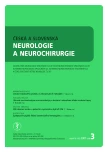Epileptosurgical Solution of Cavernous Hemangioma Associated with Focal Cortical Dysplasia in the Right Temporal Lobe in a Female-Patient with Secondary Epilepsy: a Case Report
Authors:
H. Ošlejšková 1; M. Ryzí 1; M. Brázdil 2; Z. Novák 3; I. Zichová 4; J. Skotáková 5; V. Mach 5
Authors‘ workplace:
Klinika dětské neurologie
LF MU a FN Brno
1; I. neurologická klinika LF MU
a FN U sv. Anny, Brno
2; Neurochirurgická klinika
FN USA a LF MU
3; I. patologicko-anatomický ústav
LF MU a FN U sv. Anny, Brno
4; Klinika dětské radiologie
LF MU a FN Brno
5
Published in:
Cesk Slov Neurol N 2007; 70/103(3): 316-321
Category:
Case Report
Overview
The author has presented a case-report of a 13-year-old girl with cavernous hemangioma situated in the right temporal lobe unusually associated with focal cortical dysplasia and symptomatic epileptic seizures. Having correlated clinical manifestation of the seizures, the brain MRI findings, results of ictal video-EEG and peroperative electrocorticography (ECoG), an epilepsy surgery was carried out – extended lesionectomy, i.e. removal of a cavernoma, its macroscopically recognizable hemosiderine border and region with epileptic activity in peroperative ECoG that corresponded with the uncus of parahippocampal gyrus and amygdala on the right side. Histological examinations confirmed cavernous hemangioma and focal cortical dysplasia (type IB) in an enlarged resected portion. If compared with other therapeutical solutions, this epileptosurgical approach has improved our patient's chance for long-term post-operative seizure-free life. The girl is now 12 months after the surgery without seizures and without neurological deficit.
Key words:
cavernous hemangioma – focal cortical dysplasia – symptomatic epilepsy – epilepsy of the temporal lobe – extended lesionectomy – peroperative corticography
Sources
1. Russell DS, Rubinstein LJ. Pathology of Tumours of the Nervous System. 5th ed. Baltimore: Williams and Wilkins 1989: 727-90.
2. Dbalý V. Temporální epilepsie. In: Dbalý V. Epileptochirurgie dospělých. Praha: Grada Publishing 2004: 90-112.
3. Rigamonti D, Hadley MN, Drayer BP, Johnson PC, Hoenig-Rigamonti K, Knight JT, Spetzler RF. Cerebral cavernous malformations, incidence and familial accurrence. N Engl J Med 1988; 319: 343-7.
4. Johnson PC, Wascher TM, Golfinos J, Spetzler RF. Definition and pathologic features. In: Awad IA, Barrow DL (eds). Cavernous Malformations. Park Ridge: AANS Publications Committee 1993: 1-11.
5. Otten P, Pizzolato GP, Rilliet B, Berney J. A propos de 131 cas d´angiomas caverneux (cavernomas) du S. N. C. repérés par l´analyse retrospektive de 24535 autopsies. Paris: Neurochirurgie 1989; 35: 82-3.
6. Bertalanffy H, Benes L, Miyazawa T, Alberti O, Siegel AM, Sure U. Cerebral cavernomas in the adult. Review of the literature and analysis of 72 surgically treated patients. Neurosurg Rev 2002; 25: 1-53.
7. Siegel AM. Presurgical evaluation in patients with vascular malformations. In: Rosenow F, Hans O, Luders (eds). Presurgical Assessment of the Epilepsies with Clinical Neurophysiology and Functional Imaging. Elsevier BV 2004: 395-405.
8. Moran NF, Fish DR, Kitchen N, Shorvon S, Kendall BE, Stevens JM. Supratentorial cavernous hemangiomas and epilepsy: a rewiew of the literature and case series. J Neurol Neurosurg Psychiatry 1999; 66(5): 561-8.
9. Ferroli P, Casazza M, Marras C, Mendola C, Franzini A, Broggi G. Cerebral cavernomas and seizures: a retrospective study on 163 patients who underwent pure lesionectomy. Neurol Sci 2006; 26(6): 390-4.
10. Baumann CR, Schuknecht B, Lo Russo G, Cossu M, Citterio A, Andermann F et al. Seizure outcome after resection of cavernous malformations is better when surrounding hemosiderin-stained brain also is removed. Epilepsia 2006; 47(3): 563-6.
11. Paolini S, Morace R, Di Gennaro G, Picardi A, Grammaldo LG, Meldolesi GN et al. Drug-resistant temporal lobe epilepsy due to cavernous malformations. Neurosurg Focus 2006; 21(1): e8.
12. Stefan H, Hammen T. Cavernous haemangiomas, epilepsy and treatment strategies. Acta Neurol Scand 2004; 110(6): 393-7.
13. Kraemer DL, Awad IA. Vascular malformations and epilepsy; clinical considerations and basic mechanism. Epilepsia 1994; 35 (Suppl 6): S30-43.
14. Awad IA, LeBlanc R, Little JR. Blood flow measurements in intracranial arteriovenous malformations. In: Barrow DL (eds). Neurosurgical Topics: Intracranial Vascular Malformations. Park Ridge: AANS Publications Comittee 1999: 91-8.
15. Noto S, Fujii M, Akimura T, Imoto H, Nomura S, Kajiwara K, Kato S et al. Management of patients with cavernous angiomas presenting epileptic seizures. Surg Neurol 2005 64(6): 495-8, discussion 498-9.
16. Falconer MA, Serafetinides EA. A follow-up study of surgery in temporal lobe epilepsy. J Neurol Neurosurg Psychiatry 1963; 26: 154-61.
17. Morrell F. Secondary epileptogenesis in man. Arch Neurol 1985; 42: 318-325.
18. Zevgaridis D, van Velthoven, Ebeling U, Reulen HJ. Seizure control following
surgery in supratentorial cavernous malformations: a retrospective study in 77 patients. Acta Neurochir 1996; 138: 672-7.
19. Cappabianca P, Alfieri A, Maiuri F, Mariniello G, Cirillo S, de Divitis E. Supratentorial cavernous malformations and epilepsy: seizure outcome after lesionectomy on a series of 35 patients. Clin Neurol Neurosurg 1997; 99: 179-83.
20. Kloss S, Pieper T, Pannek H, Holthausen H, Tuxhorn I. Epilepsy surgery in children with focal cortical dysplasia (FCD): results of long-term seizure outcome. Neuropediatrics 2002; 33(1): 21-6.
21. Hader WJ, Mackay M, OtsuboH, Chitoku S, Weiss S, Becker L et al. Cortical dysplastic lesions in children with intractable epilepsy: role of complete resection. J Neurosurg 2004; 100(2 Suppl Pediatrics): 110-7.
22. Cohen-Gadol AA, Ozduman K, Bronen RA, Kim JH, Spencer DD. Long-term outcome after epilepsy surgery for focal cortical dysplasia. J Neurosurg 2004; 101(1): 55-65.
23. Takebayashi S, Hashizume K, Uchida K, Tanaka T. A case of coexistence with cavernous angioma and focal cortical dysplasia. No To Shinkei 2006; 58(3): 245-9.
Labels
Paediatric neurology Neurosurgery NeurologyArticle was published in
Czech and Slovak Neurology and Neurosurgery

2007 Issue 3
Most read in this issue
- Chiari Malformation: Own Experience
- Osmotic Demyelination Syndrome – MRI Diagnosis: a Case Report
- The Brain MR Imaging in Patients with Myotonic Dystrophy DM 1
- Osteoplastic Decompressive Craniotomy
